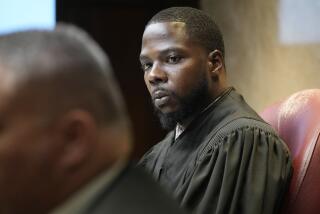Judge allows further treatment of Tucson shooting suspect
- Share via
Reporting from Tucson — A federal judge late Wednesday gave prison officials more time to try to restore the competency of accused gunman Jared Lee Loughner, whom a psychologist said had recently shown remorse over the killing of six people and the wounding of 13, including Rep. Gabrielle Giffords (D-Ariz.).
U.S. District Judge Larry Burns, who ruled in May that Loughner was mentally unfit to stand trial, extended Loughner’s treatment at a federal prison hospital in Missouri by four months. “Measurable progress toward restoration has been made,” Burns said during a lengthy hearing in Tucson.
Christina Pietz, Loughner’s primary psychologist, testified that with more treatment Loughner potentially could regain the ability to understand the legal proceedings and aid in his defense. Since he has been forced to take medication, Pietz said, he “understands he’s murdered people” and has stopped insisting that Giffords was among those shot to death in January.
“He’s used words like ‘remorseful.’ He feels guilty,” said Pietz, who considered it a sign that Loughner had gained some mental clarity. He has probably suffered from schizophrenia and depression for years, she said.
Loughner, who has pleaded not guilty to 49 charges stemming from the rampage, was statue-still during hours of testimony that offered a sometimes unsettling look at his shifting state of mind. His odd smirk had been replaced by a mostly blank stare. Occasionally he closed his eyes.
Loughner’s placid demeanor was in marked contrast to his last court appearance, in May, when he was whisked out of the courtroom after shouting, according to court transcripts: “Thank you for the free kill. She died in front of me. Your cheesiness.”
The judge cited the shift in Loughner’s behavior as a key reason for allowing his treatment to continue.
On Wednesday, in a courtroom packed with survivors of the shooting, a gaunt, pallid Loughner wore a white T-shirt and khaki pants. His dark hair was close-cropped, the result of his growing attention to hygiene, Pietz testified. He had asked that his hair be cut and his fingernails trimmed, she said. He has also stopped smearing feces on his bed, she said.
Loughner’s team, however, contended that Pietz’s memory of her conversations with him might be faulty and that his condition might be worse than her testimony suggested.
“You have sometimes described an individual we haven’t met,” defense attorney Judy Clarke said.
Loughner has been forcibly medicated continuously since July, after prison officials determined he was potentially dangerous. His attorneys asked that Loughner be taken off his drug regimen, which includes an antipsychotic medication, and recently told a federal appeals panel that prison officials should have used tranquilizers or physical restraints instead.
In court papers, Loughner’s team said the medication had done little to help him. “He is noted to be either [lying] in his bed or pacing, and often crying, and is so disabled that he has been on suicide watch since early July,” his attorneys said. “And, even after some 60 contiguous days of antipsychotic medications, he continues to be psychotic.”
But Pietz, arguably the person Loughner has seen most in recent months, testified that Loughner’s behavior had shifted in a number of ways. He is more likely to make eye contact, she said, and less likely to speak in a confusing “word salad.” He is more modest, no longer undressing in front of female staff.
Pietz said Loughner appeared to better trust his attorneys, whom he once said were blackmailing him. He also allowed a TV in his room, which he had previously said made him uncomfortable.
In his conversations with Pietz, Loughner has started showing some empathy, she said. He has spoken of his dogs and turtles with affection, she said, and wanted to attend Wednesday’s hearing partly to see his parents, who live in Tucson.
“I’m glad. I wanted to go,” Pietz recalled Loughner saying. “It’s my case. It’s about me. I should be there.”
Still, Loughner’s thoughts remain jumbled and sometimes delusional, Pietz said. He has repeatedly said someone doctored a video he saw of the shooting. Loughner has also been suicidal for months, she said. He recently wrote a note suggesting he wanted to kill himself and told his father in a phone call that he wanted to see him one more time before he committed suicide.
Pietz and Dr. James Ballenger, another expert who testified Wednesday, blamed some of Loughner’s grief on his coming to terms with the shootings. “His humanity is coming back,” Ballenger said.
More to Read
Sign up for Essential California
The most important California stories and recommendations in your inbox every morning.
You may occasionally receive promotional content from the Los Angeles Times.








